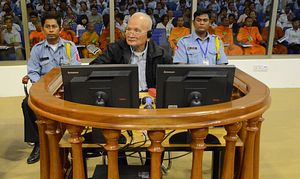Nuon Chea, a Cambodian politician and a chief ideologue as part of the notorious Khmer Rouge, died Sunday at age 93 after a brief stay in a Phnom Penh hotel for what was reportedly a toe ulcer. His death once again brought to the fore the legacy of one of the leading members of a sobering period in Cambodian history.
Given his record, Nuon Chea stood among the most dreaded men of the 20th century. Convicted of genocide, crimes against humanity and an assortment of other charges ranging from torture to enslavement, Brother Number Two was sentenced to life behind bars, twice, at a UN-backed court in Cambodia.
Born in 1926, Nuon Chea was an integral force alongside Pol Pot and his henchmen, like Khieu Samphan, who steered Cambodia into the abyss after their takeover of the country, resulting in the deaths of about 2 million people.
The Khmer Rouge were ousted by a Vietnamese invasion in 1979 and atrocities laid bare as Nuon Chea and the rest of the cadre fled to the remote northwest where they maintained a civil war with Chinese backing for the next two decades.
Only after the war was over was a serious effort made to put the leadership in the dock and the Extraordinary Chambers in the Courts for Cambodia secured two life sentences against Nuon Chea for crimes against humanity and genocide, also known as the “crime of crimes.”
In Cambodia, his death was greeted with public disdain and comments that reflected a memory of his crimes. The mood was far from forgiving.
Sorn Mno, 25 and born long after the Khmer Rouge were swept from power, told The Diplomat it was “always sad when a person dies but he did so many bad things” and the courts should have imposed the severe punishments that they did.
His sentiments were echoed by 44-year-old Kim Ly. She told The Diplomat that Nuon Chea “should be dead because he was the Khmer Rouge’s Brother Number Two,” adding his death was deserved and “a retaliation for all the bad things that he did.”
With Nuon Chea gone, Khieu Samphan, who is appealing his genocide conviction, and the commandant of the S-21 torture and extermination center Kang Guek Eav, also known as Duch, are the only surviving leaders still behind bars. Others like Ieng Sary died in prison before judgment day, while his wife Ieng Tirith died under custodial care after losing her mind.
Of them, Nuon Chea was the chief ideologue, a purist who advanced the Khmer Rouge philosophies which abolished money, all vestiges of Cambodian culture and attempted to turn the country into an agrarian utopia with catastrophic results.
Among the most startling pieces of evidence was how Nuon Chea even condemned members of his own family. He sent two nieces – Lach Vary and Lach Dara, both Chinese trained doctors who worked for the regime’s health ministry – their husbands and another two nephews to the dreaded S-21. Like 24,000 others who were interrogated by Duch, they were then sent to the Killing Fields.
Nuon Chea replaced Son Sen in 1977 as head of Santebal – the Khmer Rouge secret police. Son Sen was eventually killed along with his family amid a factional split in 1997 on the orders of Pol Pot. Their bodies were driven over by trucks.
“When Pol Pot was absent, Nuon Chea replaced him, and when Pol Pot issued an order, Nuon Chea followed up on how it was applied,” Duch testified.
While many in Pol Pot’s hierarchy escaped justice through death, Nuon Chea did not and he will not be missed. Of the genocides have that have shadowed the world since World War I, too few of those responsible of such tragedies have been arrested, charged and convicted, Nuon Chea was not one them, and his name will go down in history as guilty of the “crime of crimes.”
Luke Hunt can be followed on Twitter @lukeanthonyhunt. Ah Ny contributed to this story.

































